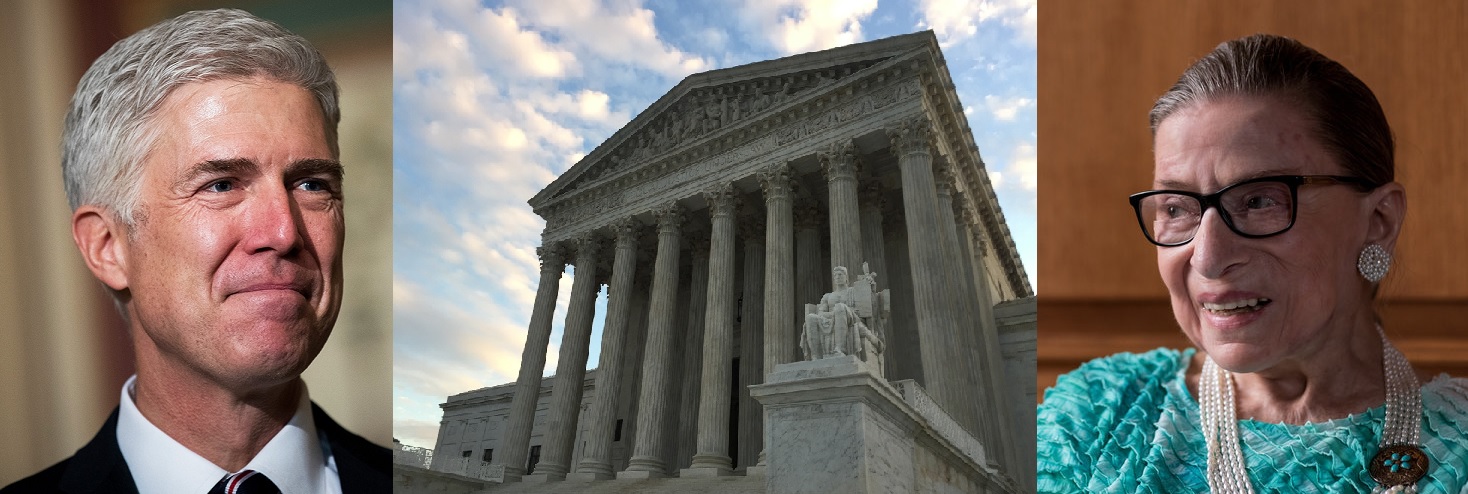Ginsburg and Gorsuch Should Explain Their Non-Recusal Decisions
Recent comments and actions warrant reckoning – or at least reasoning – for participation in certain suits

Fix the Court sent letters to Justices Ruth Bader Ginsburg and Neil Gorsuch today requesting they publicly explain their reasoning for participating in certain OT17 cases despite perceived biases.
In a series of interviews during last year’s presidential campaign, Ginsburg made several negative comments about then-candidate Donald Trump. Since then, she’s voted at least six times – on June 26, July 19, Sept. 12, Oct. 10 and twice on Dec. 4 – on the so-called travel ban cases, stemming from executive orders President Trump issued to prevent citizens of certain nations from entering the U.S. Statements Trump made as a candidate – and to which Ginsburg was likely responding – are at issue in these cases.
Gorsuch gave a talk Sept. 28 at Trump International Hotel in Washington to The Fund for American Studies. TFAS is an associate member of the State Policy Network, whose legal partners are litigating the nationwide effort to end compulsory union fees – and are representing Mark Janus in Janus v. AFSCME at the Supreme Court next year. TFAS, SPN and its legal advocates share several high-profile funders.
“Justices Ginsburg and Gorsuch have a responsibility to explain to the American people how they can remain unbiased in cases in which they have perceived prejudice,” FTC executive director Gabe Roth said. “Just as justices in the past have made public statements when confronted with potential conflicts, these two should do the same.”
One of the best-known examples of a justice explaining a non-recusal decision occurred when Justice William Rehnquist wrote a 1972 memorandum regarding Laird v. Tatum, in which he “determined that it would be appropriate […] to state the reasons which have led to [his] decision” to participate, despite having publicly discussed the central issue of the case – government surveillance of anti-war protesters – while working in the Justice Department the previous year. That his views were aired, he wrote, “cannot, in my opinion, be regarded as anything more than a random circumstance which should not by itself form a basis for disqualification,” and Rehnquist voted on the case.
Similarly, Justice Antonin Scalia released a statement regarding Cheney v. U.S. District Court in 2004, when his impartiality was questioned for having taken part in a hunting trip with the Vice President a few months before the case was argued. Citing his earlier sub judice recusal in a case on the constitutionality of the words “under God” in the Pledge of Allegiance, Scalia wrote, “[R]ecusal is the course I must take – and will take – when, on the basis of established principles and practices, I have said or done something which requires that course. […] I believe, however, that established principles and practices do not require […] recusal in the [Cheney] case,” and he participated in it.
Given the red tape and legal fees it would entail, FTC is not filing a recusal motion but prefers the justices draft explanatory statements to be released by the Supreme Court Press Office.
Roth concluded both of his letters thus: “At a time when faith in public officials is waning, being more direct about potential conflicts would do a lot of good to restore that trust. I am hopeful that this type of transparency becomes the rule in close cases – and not the exception.”